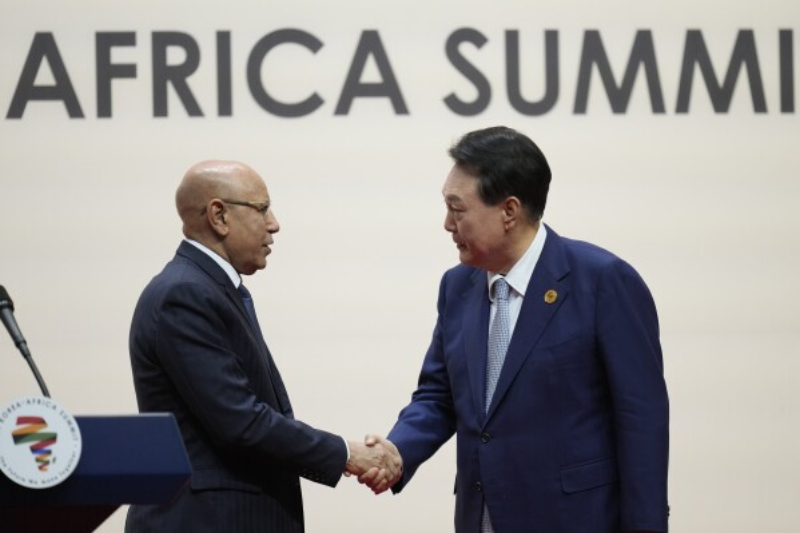South Korea will increase its development aid to Africa and seek closer collaboration with the 1.3 billion people living there on vital minerals and technologies. President Yoon Suk Yeol made this declaration while welcoming scores of African leaders to the first Korea-Africa Summit.
Yoon urged African nations in his speech to act firmly in the worldwide pressure campaign directed against North Korea. To further sour already strained relations between the two Koreas, the North has lately increased its tests of nuclear-capable missile systems and carried out provocative actions such launching hundreds of balloons loaded with rubbish and manure into South Korea.
Strategic relevance of Africa
At the United Nations, Africa’s 54 governments create a significant bloc with three rotating Security Council seats. Attending South Korea’s two-day summit, representatives from 48 African countries—including 25 heads of state—attended where trade and investment dominated the agenda.
Less than 2% of South Korea’s overall imports and exports now go toward trade with African countries. Still, the meeting represents a major step toward raising this percentage and developing relations between nations economically.
Cooperation on Critical Minerals
After Tuesday’s conference, South Korea and the African countries revealed intentions to start high-level negotiations aiming at strengthening cooperation over important minerals. Key export goods for South Korea, nickel, cobalt, graphite, and lithium are found mostly on the African continent; these are vital for technologies such as semiconductors, batteries, and electric cars.
Expanding ties in minerals and other natural resources will improve the supply chain resilience of South Korea in important technology sectors, authorities from the nation stressed. Given that South Korea has only secured significantly less mines than the United States, China, and Japan, there are rising worries in the country over ensuring a consistent supply of basic minerals.
According to President Yoon, South Korea plans to raise its total development aid commitments to Africa to about $10 billion by 2030. South Korea is offering export loans totaling $14 billion in an effort to attract more investment to the region.
Keep Reading
The president of Mauritania, Mohamed Ould Ghazouani, has expressed a strong desire for investment from South Korea in various crucial areas, such as trade, human capital, infrastructure, food security, and new technology.
Mauritania is now chairwoman of the African Union and is a new member of the G20. The prospect of a “durable partnership” was his optimistic outlook.
The nations also pledged more intense cooperation in creating smart cities based on data and intelligent transportation systems as part of sustainable infrastructure for Africa. Given some of the least developed infrastructure on the continent right now, these projects are very important.
The outreach of South Korea to Africa coincides with North Korea’s increasing activity in attempting to break out from its diplomatic isolation and foster collaboration with nations against the United States. North Korean leader Kim Jong Un has been advocating for a “new Cold War.”
The North Korean foreign ministry stated in May that the country’s ties with Africa will “continue to develop invariably” and that Pyongyang will support African nations’ efforts for “independent development under the banner of non-alignment as well as independence against imperialism.”
Following a string of North Korean provocations and military operations including an unsuccessful launch of a military surveillance satellite last month, President Yoon emphasized the dire security situation on the Korean Peninsula. He voiced expectations for cooperation among African countries to exert pressure on North Korea.
“Along with our friends in Africa, South Korea will totally implement U.N. Security Council resolutions and work to safeguard peace on the Korean Peninsula and the international community,” Yoon added.
South Korea and the African countries underlined in a joint statement their will to fully execute U.N. Security Council resolutions against North Korea. They underlined the “importance of the efforts of the international community to achieve a complete, verifiable, and irreversible denuclearizing of the Korean Peninsula.”
The Korea-Africa conference represents a turning point in the political and economic ties strengthening between South Korea and African countries. Focusing development aid, key minerals, technology, and trade, the summit seeks to create a basis for long-term, mutually beneficial relationships. The cooperative efforts started at this summit are ready to propel significant development in both Africa looking to exploit its abundant mineral resources and South Korea trying to improve the resilience of its supply chain.

